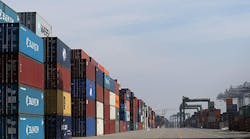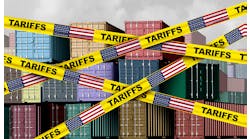On March 14, the administration announced the launch of an information-sharing initiative to pilot key freight information exchange between parts of the goods movement supply chain. Named FLOW (Freight Logistics Optimization Works), the initiative includes eighteen initial participants that represent diverse perspectives across the supply chain, including private businesses, warehousing, and logistics companies, ports, and more.
The aim is to develop a proof-of-concept information exchange to ease supply chain congestion, speed up the movement of goods, and ultimately cut costs for consumers. DOT will lead this effort, playing the role of broker and convener to bring supply chain stakeholders together to problem solve and overcome coordination challenges. This initial phase aims to produce a proof-of-concept freight information exchange by the end of the summer.
The principles of the pilot include the following: it is a voluntary, secure national exchange for freight information, it is available to participants who share data, and it is sustained by supply chain operational improvement.
A Novel Data Sharing Partnership
Recent supply chain disruptions have raised national awareness of the need for improved information exchange. Supply chain stakeholders want reliable, predictable, and accurate information about goods movement and FLOW will test the idea that cooperation on foundational freight digital infrastructure is in the interest of both public and private parties.
Resiliency—the ability to recover from an unexpected shock—requires visibility, agility, and redundancy. The lack of digital infrastructure and transparency makes the U.S. supply chains brittle and unable to adapt when faced with a shock. The goods movement chain is almost entirely privately operated and spans shipping lines, ports, terminal operators, truckers, railroads, warehouses, and cargo owners such as retailers. These different actors have made great strides in digitizing their own internal operations, but they do not always exchange information with each other. This lack of information exchange can cause delays as cargo moves from one part of the supply chain to another, driving up costs and increasing goods movement fragility.
Initial partners in FLOW include:
Port Authorities:
- Port of Long Beach
- Port of Los Angeles
- Georgia Ports Authority
Ocean Carriers:
- CMA CGM
- MSC
Terminal Operators:
- Fenix Marine Terminal
- Global Container Terminals
Business:
- Albertsons
- Gemini Shippers
- Land O’ Lakes
- Target
- True Value
Chassis:
- DCLI
- FlexiVan
Logistics and Warehousing:
- FedEx
- Prologis
- UPS
- CH Robinson
These first partners will identify and operationalize a first information exchange that will support a more resilient and fluid supply chain. FLOW will be able to address issues such as ensuring early return dates are consistent across partners, measuring more accurate chassis availability and understanding aggregate dwell time throughout the supply chain.



